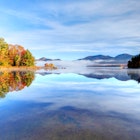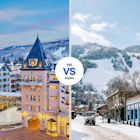
New England maples vs Colorado aspens: which US region has better fall foliage?



Do you want to tromp through New England's classic red and orange-clad hills or hike through Colorado's golden hues? Left, Sara Winter/Shutterstock. Right, Craig Zerbe/Getty Images.
Some destinations will always get pitted against one another. In this series, two passionate writers go head-to-head to explain why you should visit their chosen destination.
We're finally wearing sweatshirts in the morning, and you know what that means. It's time to book that fall foliage tour and soak in the cozy awesomeness that is nature putting on its biggest show of the year. But which cabin in the woods do you want to light that first fire in? Which woods do you want to spend your days hiking through?
Do you wear classic duck boots, jeans and a wool sweater to tromp through New England's red and orange-clad hills, or do you don your Patagonia puffer jacket and hikers to be bathed in Colorado's golden hues? Whichever captures your imagination, these two Lonely Planet writers will have you wondering, should you tap a maple or listen to the whispers of the aspens?

Why New England is the best place to go for fall foliage
Growing up and currently based in Upstate New York has positioned travel writer Lauren Breedlove in an ideal spot to explore the entire New England region for many years…and that she has. After attending college in Burlington, Vermont, and becoming a photographer, she has road-tripped with her camera all over the northeastern region to capture the foliage display every autumn. She has written extensively on New England for several publications, including Lonely Planet.
While New England is beautiful year-round, there’s one time of year that I make sure I’m not traveling elsewhere: fall. I’ve experienced autumn in numerous destinations, including Colorado, and although each foliage spot has its allure, there’s nothing quite like fall in New England. Crisp mornings at a picturesque lake, a layer of fog burning off as a vibrant foliage mirror appears in the still water. Hiking boots crunch fallen leaves on the summit approach to a high peak, my camera’s shutter attempting to keep up with palpable excitement over the endless sea of mountains cloaked in a rustic autumnal quilt. The crackle of the campfire while the sun tucks behind mountains dotted with zesty reds, deep golds and fiery oranges. Like I said, unbeatable.

New England has a cocktail of hues
Look, I’m an aspen-lover, too. Those bright, sunshine-y beauties that come with the fall season in Colorado are stunners – but in New England, we have so much more variety in our fall foliage lookbook. Our vast forests and mountains burst with a vivid spectrum thanks to our maple tree collection; special shout-out to the red and sugar maples for gifting us all those red and orange hues. Other players that fill out the palette nicely range from beeches and birches to oaks and hickories. One tree can don a few different colors all at once, even. It’s not just about the variety in color, it’s also about the intensity. New England has an ideal mix of the right environment, temperatures, and rainfall to produce extraordinary pigments. But you don’t have to take it from me – the proof is in the pudding with the sheer amount of visitors that flock to New England each year in September and October.
Ok, so most of Colorado’s major mountains are taller than ours, I’ll give you that. But that doesn’t mean it’s flat over here. We’ve got giants such as New Hampshire’s Mount Washington, Maine’s Katahdin and Vermont’s Mount Mansfield, as well as challenging treks and varied terrain to offer. We also have the coast! It’s not every day you can smell the ocean air while gazing upon a foliage fête. New England does have some big cities, but we also have a massive amount of wild backcountry to explore. In places like Maine’s remote Baxter State Park, you’re more likely to come across a moose than another person. It feels easier to get further off-grid in New England and find solitude. In Colorado, many of the backcountry trails require four-wheel drive vehicles down logging roads that can be tricky to navigate, whereas in New England, you can get to most of the great trails with a regular car, making them more accessible. We also have the opportunity to view foliage in different states within one season since the colors kick off in northern Maine first, and work their way south. New England in the fall is made for road-tripping.
Fall in New England is a whole vibe
Autumn isn’t just about the leaves (though, yes, it’s important). It’s about the whole atmosphere, and New England nails it. Sorry, Colorado, but fall is cozier over here. We have small, historic towns all over the place that’ll charm your socks off with handmade scarecrows, roadside farmstands, and pumpkins adorning the porches of seemingly every Victorian or Colonial home. Old churches and covered bridges abound, and cute, catch-all general stores are hidden gems to come across, selling fresh cider, donuts, and other local goodies like our quintessential maple syrup, of course.

Why Colorado is the best place to go for fall foliage
Since moving to Colorado more than a decade ago, you could say writer Sarah Kuta has become a bit obsessed with leaf-peeping. From mid-September through mid-October, she spends every weekend adventuring around the Colorado Rockies to soak up the views of the state’s golden-yellow aspens.
At the end of every summer, I eagerly await the first crisp morning that signals the arrival of fall in Colorado. For me, this moment also means it’s time to partake in one of my all-time favorite pastimes: leaf-peeping. I take scenic drives, I hike, I mountain bike, I picnic, I ride gondolas at ski resorts – all so that I can immerse myself in Colorado’s flashy fall foliage.
Colorado is famous for its quaking aspen trees – there’s even a famous mountain town and ski resort named after these tall, white-barked beauties. Aspens (Populus tremuloides) are one of the few species of deciduous trees that are hardy enough to survive in the Colorado Rockies. Growing at elevations between 5,600 and 11,000 feet above sea level, they cover 5 million acres – or roughly 20 percent – of the state’s forests, according to the Colorado State Forest Service.
You might think that aspens turn a uniform, golden-yellow hue. But, if you take a closer look (and if you look at enough trees in different locations and at different times throughout the fall), you’ll see their foliage actually represents more of a spectrum of colors – from neon yellowish-green to vibrant orange to bright red. The varying shades result from a combination of weather conditions and the trees’ genetics.
Aspens are usually interspersed with evergreens. The contrast between the dark green needles, the yellow leaves and the bright blue sky (because the sun is nearly always shining in Colorado) makes for a seriously beautiful color palette. When a cool breeze blows through, it also causes the aspen leaves to “dance” (or “quake,” which is where their name comes from). I could spend hours looking up at the shimmering leaves as these flutter in the sunshine – truly, nothing is more magical. I feel calmer just thinking about it.

Aspens play an important role in the ecosystem
Aspens are not only gorgeous, but they’re also scientifically fascinating – and as a self-described nerd, that’s another reason why I adore them so much. Since summers in the mountains are so short, aspen seeds often don’t have enough time to germinate. Instead, the trees send out suckers from their roots, which eventually spring up into new mature trees. Because of this unique reproduction method, all of the aspen trees in a particular patch are clones of one another – identical twins that share an interconnected root network. (In neighboring Utah, a stand of cloned aspens called “Pando” is one of the largest living organisms on the planet, with around 40,000 trees spread across 106 acres.)
And, because aspens love sun, they can thrive in places where other trees would shrivel up and die – including areas that have been burned by wildfires. Once enough aspen trees flourish, they provide much-needed dappled shade that allows other plants to grow. Moose and elk like to snack on aspen leaves and bark, and the trunks provide nesting habitat for woodpeckers and other birds. On a camping trip a few years ago, I watched a moose skillfully strip the leaves from branch after branch in an aspen grove.
The best time to see Colorado’s aspens
Colorado’s aspens put on a rolling show from about mid-September to mid-October, though the exact timing each year depends on the weather. The trees at the highest elevations begin to change colors first, followed by those at progressively lower and lower elevations.
Visit pretty much any Colorado mountain town during that window – Aspen, Breckenridge, Crested Butte, Silverthorne, Leadville, Winter Park, just to name a few – and you’ll likely see at least a few stands of aspens that are still gold. I also recommend planning a road trip along one of Colorado’s Scenic & Historic Byways (many of which are now conveniently equipped with charging stations for electric vehicles).
Explore related stories









